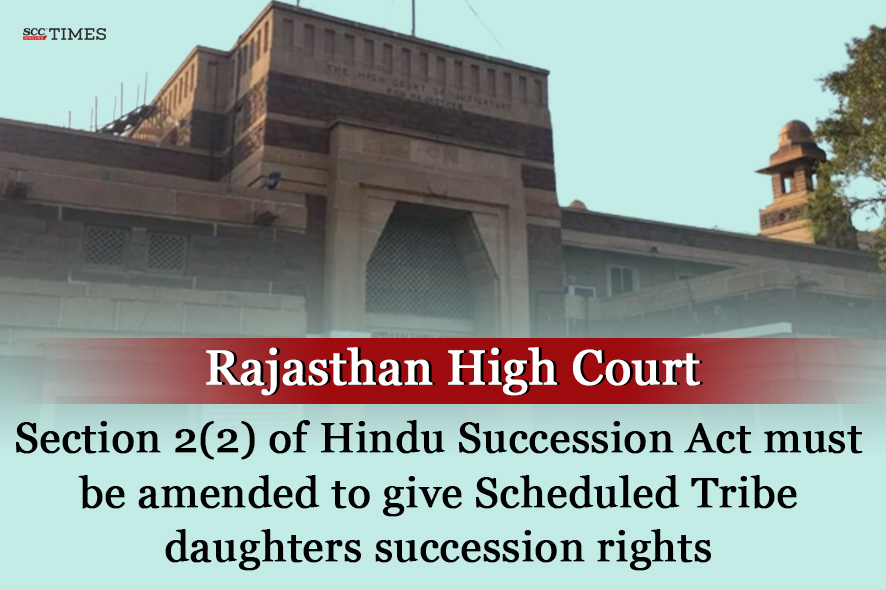Raj HC: ‘Scheduled Tribe Daughter Entitled to Succession Rights’

Rajasthan High Court: In a civil writ petition filed by the petitioner against an order of the Board of Revenue holding that the petitioner, as a Scheduled Tribe daughter, did not have succession rights, the Single-Judge Bench of Anoop Kumar Dhand, J., while setting aside the Board’s order, held that the denial of succession rights to a schedule tribe daughter on the basis of her gender is a violation of her fundamental right to equality. The Court emphasized that when daughters belonging to non-Scheduled Tribe communities are entitled to an equal share, there is no justification for denying the same right to a daughter of a Scheduled Tribe community. The Court further noted that the provisions contained under Section 2(2) of the Hindu Succession Act, 1956 (‘the Act of 1956’) which lays down that the Act of 1956 does not apply to Scheduled Tribes must be amended to safeguard and promote the rights of Female Members of the Scheduled Tribe community.
Background
The petitioner, belonging to the Meena community, which is a Scheduled Tribe, challenged a gift deed executed by her father in favor of her brother’s wife. The petitioner’s civil suit seeking cancellation of the gift deed was rejected on the technical ground that she first needed to obtain a declaration of her Khatedari rights from a Revenue Court. Consequently, she filed a suit for declaration of her rights before the Sub Divisional Officer (‘SDO’). The respondents submitted an application under Order 7 Rule 11 of the Civil Procedure Code, 1908 (‘CPC’) for the rejection of the plaint, arguing that the Act of 1956, does not apply to members of Scheduled Tribes. The SDO rejected this application, but the Board of Revenue allowed the respondents’ revision petition, holding that the petitioner, as a Scheduled Tribe daughter, did not have succession rights. Aggrieved by this the petitioner filed the present petition.
Analysis and Decision
The Court noted that the Supreme Court in Kirith V. V. Daduram, 2024 SCC OnLine SC 3810observed that the view expressed in the case of Kamla Neti V. Lao, (2023) 3 SCC 528that unless a separate notification is issued by the Central Government in the Official Gazette, female members of Schedule Tribes are not entitled to claim succession rights in the ancestral property, was causing discrimination against the females belonging to the Scheduled Tribe Category. The Supreme Court had further observed that the provisions contained under Section 2(2) of the Act of 1956 are required to be looked into to bring suitable amendments so as to ensure right of equality, guaranteed under the Articles 15 and 21 of the Constitution of Indiaare not infringed. The Court noted that in Ram Charan v. Sukhram, 2025 SCC OnLine SC 1465it was held that unless otherwise prescribed in law, denying the female heir a right in the property only exacerbates gender division and discrimination, which the law should ensure to weed out.
In light of the afore-stated decisions the Court found the Board of Revenue’s judgment unsustainable and set it aside. The Court rejected the respondents’ application under Order 7 Rule 11 CPC and directed the SDO to adjudicate the suit on its merits expeditiously.
The Court noted that the Supreme Court in Kamla Neti V. Lao, (2023) 3 SCC 528has observed that,
“there may not be any justification to deny the right of survivorship so far as the female member of the Tribal is concerned. When the daughter belonging to the non- tribal is entitled to the equal share in the property of the father, there is no reason to deny such right to the daughter of the Tribal community. Female tribal is entitled to parity with male tribal in intestate succession. To deny the equal right to the daughter belonging to the tribal even after a period of 70 years of the Constitution of India under which right to equality is guaranteed, it is high time for the Central Government to look into the matter and if required, to amend the provisions of the Hindu Succession Act by which the Hindu Succession Act is not made applicable to the members of the Scheduled Tribe.”
The Court noted that the Constitutioninspired by a global rise in women’s empowerment movements, enshrines fundamental rights to protect and promote gender equality. Articles 14, 15, 16, and 21 prohibit discrimination based on sex and mandate equal opportunities, affirmative action, and equal pay. The Preamble promises social, economic, and political justice, and the 73rd and 74th Constitutional Amendments have furthered women’s participation in governance. The Constitution recognizes women as a distinct group and prohibits all forms of discrimination against them. However, the provisions of Section 2(2) of the Hindu Succession Act, 1956act as a barrier to female members of Scheduled Tribes from asserting their succession rights in ancestral property. Denying a tribal woman an equal share in her father’s property, while daughters from non-Scheduled Tribe communities are entitled to it, is a violation of her fundamental right to equality under the Constitution. Female Tribal is entitled to parity with Male Tribal in the matters of intestate succession. This discriminatory practice is manifestly unjustified after more than seven decades of independence. It is, therefore, the right time to revisit and amend Section 2(2) of the Act of 1956 to safeguard the rights of Scheduled Tribe women.
The Court noted that it hopes and trusts that the Central government will look into the matter and take appropriate decision in light of the directions issued by the Supreme Court under Kamla Neti V. Lao, (2023) 3 SCC 528.
[Manni Devi v. Rama Devi, S.B. Civil Writ Petition No. 10638/2025, decided on 22-07-2025]
Advocates who appeared in this case :
For the Petitioner: Prahlad Sharma, Khem Singh, Ram Prasad Sharma, Lakhan Sharma, Advocates
For the Respondents: Bajrang Lal Choudhary, Advocate

